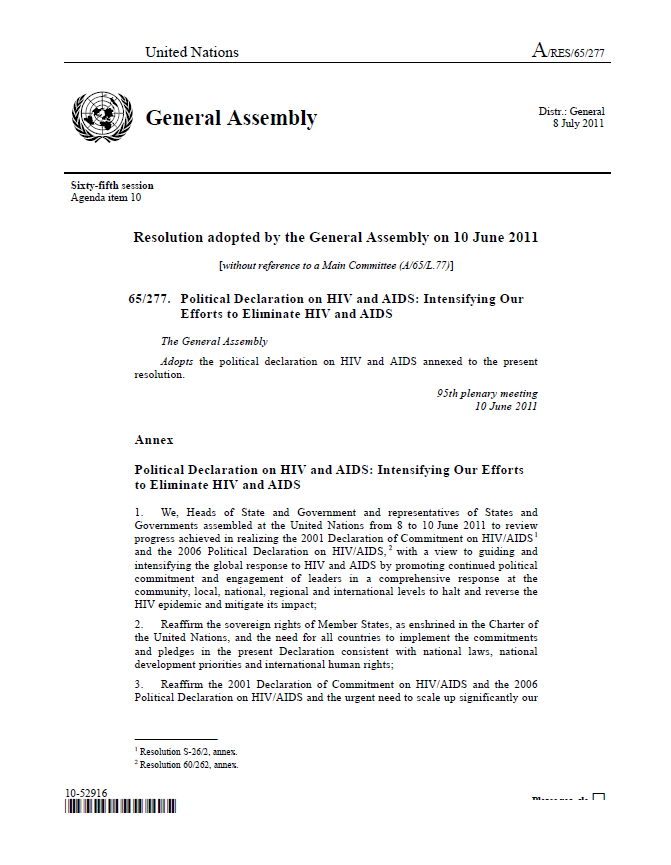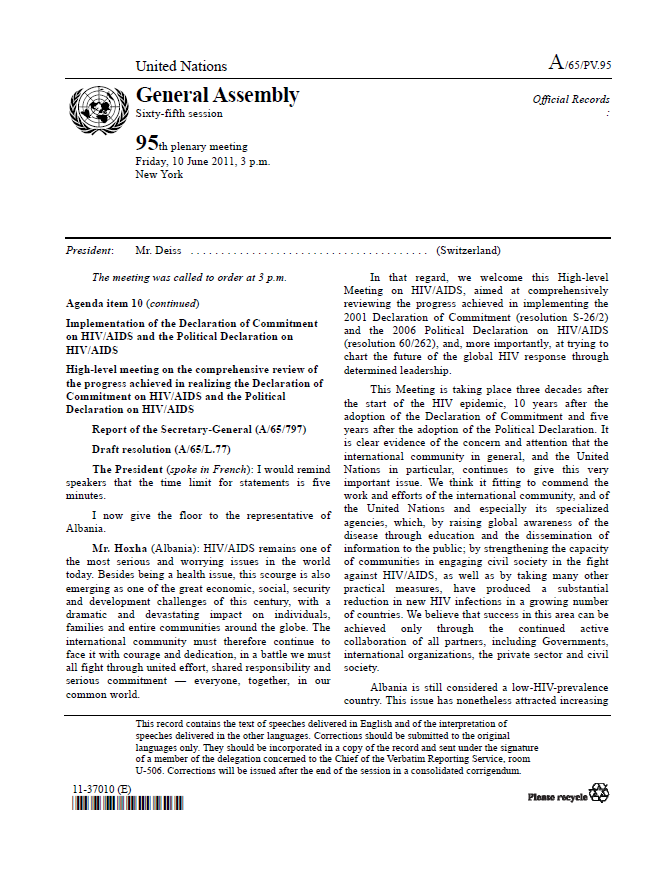2011 Political Declaration on HIV and AIDS
Analysis of precedential value
This declaration is the product of the UN High-Level Meeting on HIV/AIDS in June 2011, which included presentations from representatives of over 160 national, intergovernmental and civil society organisations and institutions, as well as the private sector. It was adopted by the UN General Assembly without a general vote that same month. The General Assembly is the preeminent governing body of the UN system and consists of all 193 UN Member States.
Used as precedent
gender norms and stereotypes, intersectionality
“Remain deeply concerned that, globally, women and girls are still the most affected by the epidemic and that they bear a disproportionate share of the caregiving burden, and that the ability of women and girls to protect themselvesfrom HIV continues to be compromised by physiological factors, gender inequalities, including unequal legal, economic and social status, insufficient access to health care and services, including for sexual and reproductive health, and all forms of discrimination and violence, including sexual violence and exploitation.” (paragraph 21)
key and vulnerable populations
“Welcome the adoption of the Convention on the Rights of Persons with Disabilities, and recognize the need to take into account the rights of persons with disabilities as set forth in that Convention, in particular with regard to health, education, accessibility and information, in the formulation of our global response to HIV and AIDS.” (paragraph 23)
“Note with concern that prevention, treatment, care and support programmes have not been adequately targeted or made accessible to persons with disabilities.” (paragraph 31)
“Commit to address, according to national legislation, the vulnerabilities to HIV experienced by migrant and mobile populations and support their access to HIV prevention, treatment, care and support.” (paragraph 84)
human rights
“Reaffirm the commitment to fulfil obligations to promote universal respect for and the observance and protection of all human rights and fundamental freedoms for all in accordance with the Charter, the Universal Declaration of Human Rights and other instruments relating to human rights and international law; and emphasize the importance of cultural, ethical and religious values, the vital role of the family and the community and, in particular, of people living with and affected by HIV, including their families, and the need to take into account the particularities of each country in sustaining national HIV and AIDS responses, reaching all people living with HIV, delivering HIV prevention, treatment, care and support and strengthening health systems, in particular primary health care.” (paragraph 38)
“Commit to intensify national efforts to create enabling legal, social and policy frameworks in each national context in order to eliminate stigma, discrimination and violence related to HIV and promote access to HIV prevention, treatment, care and support and non-discriminatory access to education, health care, employment and social services, provide legal protections for people affected by HIV, including inheritance rights and respect for privacy and confidentiality, and promote and protect all human rights and fundamental freedoms, with particular attention to all people vulnerable to and affected by HIV.” (paragraph 77)
stigma and discrimination
“Reaffirm that the full realization of all human rights and fundamental freedoms for all is an essential element in the global response to the HIV epidemic, including in the areas of prevention, treatment, care and support, recognize that addressing stigma and discrimination against people living with, presumed to be living with or affected by HIV, including their families, is also a critical element in combating the global HIV epidemic, and recognize also the need, as appropriate, to strengthen national policies and legislation to address such stigma and discrimination.” (paragraph 39)
“Recognize that close cooperation with people living with HIV and populations at higher risk of HIV infection will facilitate the achievement of a more effective HIV and AIDS response, and emphasize that people living with and affected by HIV, including their families, should enjoy equal participation in social, economic and cultural activities, without prejudice and discrimination, and that they should have equal access to health care and community support as all members of the community.” (paragraph 40)
reproductive rights
“Recognize that access to sexual and reproductive health has been and continues to be essential for HIV and AIDS responses and that Governments have the responsibility to provide for public health, with special attention to families, women and children.” (paragraph 41)
“Facilitating access to sexual and reproductive health-care services.” (paragraph 59(k))
key population and community leadership
“Recognize the role that community organizations play, including those run by people living with HIV, in sustaining national and local HIV and AIDS responses, reaching all people living with HIV, delivering prevention, treatment, care and support services and strengthening health systems, in particular the primary healthcare approach.” (paragraph 44)
“Commit to continue engaging people living with and affected by HIV in decisionmaking and planning, implementing and evaluating the response, and to partner with local leaders and civil society, including community-based organizations, to develop and scale up community-led HIV services and to address stigma and discrimination.” (paragraph 57)
comprehensive sexuality education, gender equality
“Pledge to eliminate gender inequalities and gender-based abuse and violence, increase the capacity of women and adolescent girls to protect themselves from the risk of HIV infection, principally through the provision of health care and services, including, inter alia, sexual and reproductive health, as well as full access to comprehensive information and education, ensure that women can exercise their right to have control over, and decide freely and responsibly on, matters related to their sexuality, including their sexual and reproductive health, free of coercion, discrimination and violence, in order to increase their ability to protect themselves from HIV infection, and take all necessary measures to create an enabling environment for the empowerment of women and to strengthen their economic independence, and, in this context, reiterate the importance of the role of men and boys in achieving gender equality.” (paragraph 53)
harm reduction
“Giving consideration, as appropriate, to implementing and expanding risk- and harm-reduction programmes, taking into account the WHO, UNODC, UNAIDS Technical Guide for Countries to Set Targets for Universal Access to HIV Prevention, Treatment and Care for Injecting Drug Users, 7 in accordance with national legislation.” (paragraph 59(h))
negative legal determinants
“Commit to review, as appropriate, laws and policies that adversely affect the successful, effective and equitable delivery of HIV prevention, treatment, care and support programmes to people living with and affected by HIV and to consider their review in accordance with relevant national review frameworks and time frames.” (paragraph 78)
positive legal determinants, stigma and discrimination
“Commit to promoting laws and policies that ensure the full realization of all human rights and fundamental freedoms for young people, particularly those living with HIV and those at higher risk of HIV infection, so as to eliminate the stigma and discrimination they face.” (paragraph 83)

